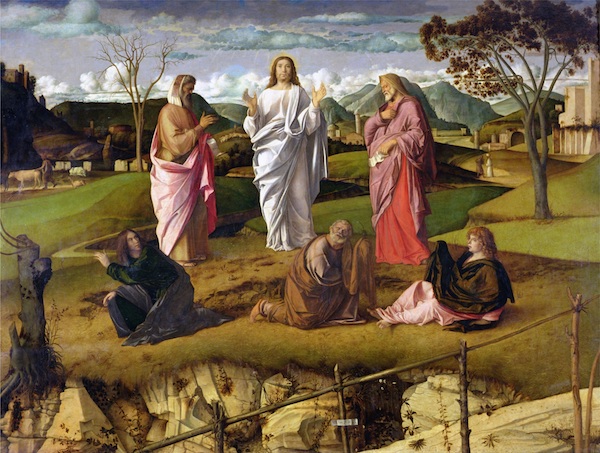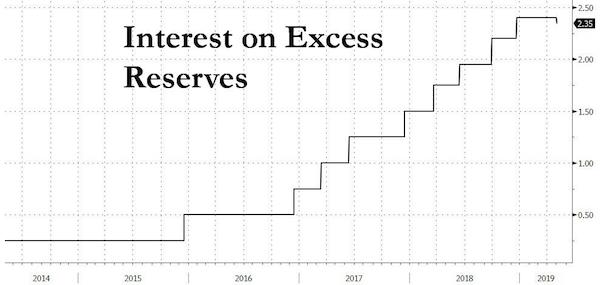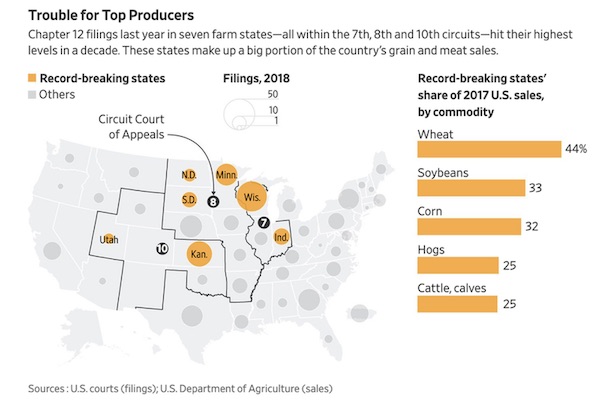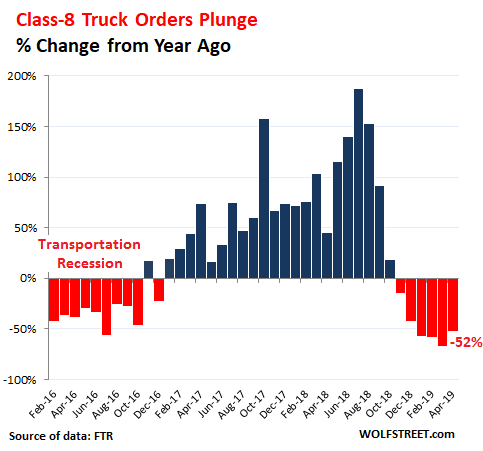
Giovanni Bellini The transfiguration c1490

The Democrats, as personified by Pelosi, Schumer, Hillary, Biden etc., have no identity other than being against everything Trump. There are people in the party who do have ideas and an identity, like Tulsi Gabbard, AOC, and I’m not saying they’re all great ideas, but at least they have some. But they’re being sidelined.
And it’s of course funny to see Pelosi “pre-accusing” Trump of doing what she has done for 2+ years now. Accuse your opponent of what you yourself have done. Classic.
• Pelosi: Trump Could Contest 2020 Election Results – Be Prepared (Carter)
In a New York Times interview on Saturday, Nancy Pelosi (D-Cal), shared her concerned that President Trump would not voluntarily step down unless Democrats win by a “big” enough margin in 2020. The Democratic Speaker of the House of Representative, expressed her concern over a possible scenario where Trump would not accept the election results if he were to lose re-election by a slim margin, the NY Times reported. “We have to inoculate against that, we have to be prepared for that,” Pelosi told the newspaper Wednesday.
“If we win by four seats, by a thousand votes each, he’s not going to respect the election,” said Ms. Pelosi, recalling her thinking in the run-up to the 2018 elections. “He would poison the public mind. He would challenge each of the races; he would say you can’t seat these people,” she added. “We had to win. Imagine if we hadn’t won — oh, don’t even imagine. So, as we go forward, we have to have the same approach.” In recent weeks Ms. Pelosi has told associates that she does not automatically trust the president to respect the results of any election short of an overwhelming defeat.

Biden literally has nothing at all. Other than scolding Trump.
• Joe Biden Says He ‘Doesn’t Have Time’ To Lay Out His Healthcare Plan (Ind.)
As Joe Biden storms through Iowa and prepares for his first visit as a presidential candidate in South Carolina, the Democratic front-runner has said he doesn’t “have the time” to lay out the details of his healthcare plan. “I don’t have time; I don’t want to keep you standing any longer,” Mr Biden said recently in Iowa City, declining to lay out his vision for America’s healthcare future to the assembled crowd, according to POLITICO. Likewise Mr Biden has been less than exhaustive when it comes to his other plans, be it foreign policy, or how to tackle climate change. The approach — one in which the former vice president has focused on the values needed in an American president, instead of on specifics of policy — stands in contrast to some of his stiffest competition from fellow Democrats hoping to shake up Democratic politics as we know it.
For months now, his closest competitor in the polls, Bernie Sanders, has been plugging his universal healthcare plan on the campaign trail, which he has dubbed Medicare for All. It’s a policy the Vermont senator has introduced repeatedly in Congress, and ran on in 2016, too. But Mr Sanders isn’t alone in pushing policy in the race. Elizabeth Warren has become known for doing so, offering up plans on issues ranging from healthcare – increase consumer subsidies, force insurers to accept tougher rules, and make insurance cheaper in the US — to improving accountability for private companies in charge of military housing.

Two different takes on the same topic. First, the Press Association, which labels Paul Joseph Watson and James Woods as “Right-Wing Extremists”. A bit much, perhaps? Other labels I see flash by are far-right, alt-right, extremist conservatives. Isn’t it the labeling itself that is extremist?
• Trump Criticizes Social Media Bans Of Right-Wing Extremists (PA)
US president Donald Trump has criticised social media companies after Facebook banned a number of extremist figures and has declared he was “monitoring and watching, closely!!” Mr Trump, who tweeted and retweeted complaints on Friday and Saturday, said he would “monitor the censorship of AMERICAN CITIZENS on social media platforms”. He has previously claimed social media companies are biased against conservatives, something the companies have rejected as untrue. His comments came after Facebook this week banned Louis Farrakhan, Alex Jones and other extremists, saying they violated its ban on “dangerous individuals”.
The company also removed right-wing personalities Paul Nehlen, Milo Yiannopoulos, Paul Joseph Watson and Laura Loomer, along with Mr Jones’s site, Infowars, which often posts conspiracy theories. The latest bans apply to Facebook’s main service and to Instagram, and extend to fan pages and other related accounts. Facebook’s move signalled new effort by the social media giant to remove people and groups promoting objectionable material such as hate, racism and anti-Semitism. The company said it has “always banned” people or groups that proclaim a violent or hateful mission or are engaged in acts of hate or violence, regardless of political ideology. On Twitter, Mr Trump cited a number of individuals he said were being unfairly treated by social media companies, including Mr Watson and actor James Woods. He insisted it was “getting worse and worse for Conservatives on social media!”

But here’s how Cristina Laila at Gateway Pundit, the site known for Cassandra Fairbanks’ reporting on Julian Assange, phrases the issue. Whole different vocabulary.
Still, there’s a much bigger issue here. As I wrote in the comments the other day: What Facebook and Google are doing is very dangerous for the fabric of society. They’re turning us into China. It’s equal to saying: you cannot have a car, or gas, or a phone, a home. Because you grow a beard, or you have a crappy old car, or whatever.
Or it’s like saying you cannot drive on a certain road, maybe that’s a better example. At some point infrastructure must be available to everyone. You can’t say: this is private, go build your own road, or put up your own telephone poles, because your skin is black and we don’t like that around here.
“Facebook is a private company” is dead before you hit the water (for the same reason as AT&T). Problem is, no politician wants to burn their hands on the issue, which they don’t understand to begin with, until it’s too late. It’s much easier to say: look over there, those guys don’t do anything either.”
So, should Facebook be able to throw people out that haven’t been accused of anything criminal?
• Trump Fires Off Tweetstorm on Social Media Censorship of Conservatives (GP)
The tech tyrants at Facebook went into overdrive this week and banned Milo Yiannopoulos, Laura Loomer, Paul Joseph Watson and Alex Jones — without any explanation, the conservative journalists were labeled “dangerous” by Facebook. President Trump fired off a tweetstorm Friday evening on the social media censorship of conservatives and named James Woods and Paul Joseph Watson. “I am continuing to monitor the censorship of AMERICAN CITIZENS on social media platforms. This is the United States of America — and we have what’s known as FREEDOM OF SPEECH! We are monitoring and watching, closely!!” Trump tweeted. “We’re looking into it,” Trump said as he defended his friends Diamond and Silk.
“So surprised to see Conservative thinkers like James Woods banned from Twitter, and Paul Watson banned from Facebook!” Trump said linking to a Breitbart article on Twitter’s silencing of James Woods. Paul Joseph Watson works for Infowars and has been employed by Alex Jones for several years. On Thursday Paul Joseph Watson was banned from Facebook for being associated with Infowars and Alex Jones. Paul Joseph Watson has NEVER broken Facebook rules… But he associates with Alex Jones. Facebook is now banning anyone who is linked to Infowars or has shared too many stories from the conservative Infowars page. But it’s even worse… It is now a violation of Facebook policy to speak positively ANYWHERE about people they don’t like.
Twitter also banned conservative actor James Woods last weekend for paraphrasing American essayist, poet and philosopher Ralph Waldo Emerson, for “abusive behavior.” James Woods tweeted, “If you try to kill the King, you better not miss.” #HangThemAll – similar to a quote from an essay Emerson wrote on Plato:“When you strike at a king, you must kill him.”

If Americans were interested in the truth, they’d insist on their politicians and media and intelligence talking to the VIPS and Julian Assange. The fact that they haven’t, tells you all you need to know.
• Orwellian Cloud Hovers Over Russiagate (McGovern)
George Orwell would have been in stitches Wednesday watching Attorney General William Barr and members of the Senate Judiciary Committee spar on Russia-gate. The hearing had the hallmarks of the intentionally or naively blind leading the blind with political shamelessness. From time to time the discussion turned to the absence of a legal “predicate” to investigate President Donald Trump for colluding with Russia. That is, of course, important; and we can expect to hear a lot more about that in coming months. More important: what remains unacknowledged is the absence of an evidence-based major premise that should have been in place to anchor the rhetoric and accusations about Russia-gate over the past three years. With a lack of evidence sufficient to support a major premise, any syllogism falls of its own weight.
The major premise that Russia hacked into the Democratic National Committee and gave WikiLeaks highly embarrassing emails cannot bear close scrutiny. Yes, former CIA Director John Brennan has told Congress he does not “do evidence.” In the same odd vein, Brennan’s former FBI counterpart James Comey chose not to “do evidence” when he failed to seize and inspect the DNC computers that a contractor-of-ill-repute working for the DNC claimed were hacked by Russia. Call us old fashioned, but we Veteran Intelligence Professionals for Sanity (VIPS) still “do evidence” — and, in the case at hand, forensic investigation. For those who “can handle the truth,” the two former NSA technical directors in VIPS can readily explain how the DNC emails were not hacked — by Russia or anyone else — but rather were copied and leaked by someone with physical access to the DNC computers.

The Fed is a socialist organization.
• Fed To Give Banks A $36 Billion Taxpayer-Funded Subsidy (Middleton)
Before 2009, the Fed did not pay interest on banks’ excess reserves held at the Fed. This practice was introduced as a taxpayer-funded subsidy to the banks during the crisis (taxpayer-funded because the Fed turns over any profit at the end of the year to the Treasury). After beginning this practice, the Fed’s chief trader, Simon Potter, realized it could be used to raise interest rates without expelling excess reserves from the Fed, by sucking liquidity out of the short-term markets. In fall 2015, it began raising the interest rate on excess reserves, with the anticipated effect. At a current rate of about $36 billion a year, this is a cost to the Treasury that is indefensible. This amount is about half the budget for food stamps, for example, which politicians want to cut. There is no provision for these funds ever to be paid back. It is welfare for the bankers.

If the banks had been required to take excess reserves back onto their books it would have required financial disclosure of their quality, which is probably toxic for many. However, with the Financial Accounting Standards Board recently promulgating Financial Accounting Statements 56 and, previously, 157, the “extend and pretend” statement, it would seem they feel less and less need for financial disclosure of any kind. FAS 56 states that the government does not have to disclose what it spends taxpayers’ money on because of national security concerns.

Lose big and do a deal. It would be voted down.
• May Urges Corbyn To Agree A Brexit Deal (R.)
British Prime Minister Theresa May has stepped up calls on Labour Party leader Jeremy Corbyn to agree a cross-party deal to leave the European Union, following poor results for both parties in local elections on Thursday. May’s Conservatives lost more than a thousand seats on English local councils that were up for re-election, and Labour – which would typically aim to gain hundreds of seats in a mid-term vote – instead lost 81. Both parties have been locked in talks for the past few weeks to try to broker a Brexit deal that can get a majority in Parliament, after May’s minority government suffered three heavy defeats on her preferred deal earlier this year.
Senior Conservatives said on Saturday there was an increased need for compromise after the local election results, and the leader of the Scottish branch of the Conservative Party said a deal with Labour could be done within days. May added her voice to these calls in an essay published in a Sunday newspaper. “To the Leader of the Opposition I say this: Let’s listen to what the voters said in the local elections and put our differences aside for a moment. Let’s do a deal,” she wrote in the Mail on Sunday. The Sunday Times reported that the Conservatives would offer new concessions to Labour when talks restart on Tuesday, including a temporary customs union with the European Union, which would last until a national election due in June 2022.
“At that point Labour could use their manifesto to argue for a softer Brexit if they wanted to and a new Conservative prime minister could argue for a harder Brexit,” a source cited by the Sunday Times said.

There is no solution. the sooner everyone understands that the better. Even a national government is now out of the question.
• Anger Grows At May-Corbyn Bid To Stitch Up Brexit Deal (G.)
Last-ditch efforts by Theresa May and Jeremy Corbyn to strike a compromise on Brexit looked doomed on Saturday as the party leaders faced mounting revolts from their own MPs and activists. Following Thursday’s local elections, in which both the Conservatives and Labour were punished severely by voters for failing to break the political deadlock, May and Corbyn have insisted their parties must now urgently agree a way forward in cross-party talks which will resume on Tuesday. On Saturday the prime minister reiterated her appeal, saying: “We have to find a way to break the deadlock. I believe the results of the local elections give fresh urgency to this.”
But opposition MPs and Tory Brexiters warned any deal the leadership teams stitch up behind the scenes would face inevitable defeat in parliament and cause more acrimony in the parties. The Observer can reveal that 104 opposition MPs, mainly from Labour but also SNP, Change UK, Green and Plaid Cymru, have written to May and Corbyn insisting they will not back a “Westminster stitch-up” unless there is a firm guarantee that any deal is then put to a confirmatory referendum. The MPs say: “The very worst thing we could do at this time is a Westminster stitch-up whether over the PM’s deal or another deal. This risks alienating both those who voted leave in 2016 and those who voted remain.”
They say that, “whatever the deal” is, it must be the subject of another referendum so voters can have the “final say”. Separately, senior Tory MPs insisted that any deal struck with Labour that involved anything close to a customs union – Corbyn’s central demand in the talks – would be rejected by more than 100 of the party’s MPs, who would see it as a betrayal of May’s promises on Brexit.

No, both.
• Austerity, Not ‘Failure’ Of Brexit, Behind Tories’ Election Wipeout (G.)
In my book Mr Osborne’s Economic Experiment (2015), I pointed out that the “age of austerity” experienced during the post-1945 Attlee government was unavoidable as a debilitated UK adapted from a wartime economy to peacetime. Resources were strictly limited, and production had to be channelled away from armaments towards the normal needs of the population. Spending power was restricted because goods and food were in short supply. The austerity policy imposed by the Cameron-Osborne administration in 2010-15 – in coalition, let us not forget, with the Lib Dems – was a policy choice. George Osborne, in particular, seized the opportunity of the financial crisis of 2007-09 to cut back on public spending, or at least restrain its rate of growth.
The most obvious victims were local authorities and the electors they serve. Cuts varying between 30% and 40% were imposed on central government grants to local authorities, and the consequences were cumulative. Hardly a day goes by without sad reports of the impact the cuts are having on public services, one of the most recent being the way teachers in overstretched state schools are having to dip into their own pockets to provide textbooks. There are countless other examples. We were told by Theresa May and Philip Hammond, the chancellor, that austerity was coming to an end. But there is precious little sign of it. Which brings us back – I know you have been waiting for it – to the way that Brexit would compound the deleterious effects of austerity, a conclusion reached by every forecast I have examined.

Big Ag wants it all. But YOU can still go look for a farmers’ market.
• American Farmers Go Bankrupt (ZH)
The collapse of multi-generational family farms has sent bankruptcies in the Midwest to ten-year highs. “Bankruptcies in three regions covering major farm states last year rose to the highest level in at least 10 years. The Seventh Circuit Court of Appeals, which includes Illinois, Indiana and Wisconsin, had double the bankruptcies in 2018 compared with 2008. In the Eighth Circuit, which includes states from North Dakota to Arkansas, bankruptcies swelled 96%. The 10th Circuit, which covers Kansas and other states, last year had 59% more bankruptcies than a decade earlier,” reported WSJ. Steffes Group, a top auction firm in the upper Midwest, has seen auction activity rise 40% in 2019. “Up until now, there wasn’t a lot of motivation to exit farming,” said auctioneer Scott Steffes. “Now, what I’m hearing from folks is, ‘It’s no longer fun to farm.’”


There are far too many trucks anyway.
• US Trucking Skids into Downturn after Phenomenal Boom (WS)
Orders for Class-8 trucks – the heavy trucks that haul consumer goods, equipment, commodities, and supplies across the US to feed the goods-based economy – plunged 52% in April compared to April last year, to 16,400 orders, according to FTR Transportation Intelligence on Friday. It was the lowest April since 2016 when the industry cycled through its last transportation recession. This comes after orders had already plunged 67% year-over-year in March, 58% in February and January, and 43% in December. The collapse in orders is on the scale of the last transportation recession in 2015 and 2016. The chart shows the percent change of orders for each month compared to a year earlier:

The industry is very cyclical with big swings in both directions. Trucking companies get exuberant when capacity tightens and freight rates shoot up as they did in late 2017 and 2018, and they’re inclined to order when business is booming, but it takes a while to get these trucks built, and order backlogs at truck manufacturers piled up to reach close a year at the peak in 2018. Fear of not getting the equipment when they need it can cause industry-wide bouts of over-ordering at the peak of the cycle, which was summer 2018. But as capacity rises, and the cyclical freight business backs off from its blistering growth phase and ticks down a little as it has been since late 2018, trucking companies adjust by reducing their orders, and when push comes to shove, if they can still do it, by cancelling their orders. And that’s what is happening here.

I think perhaps everyone intuitively understands how to re-design cities. Cars must go first.
• Urban Greening Can Save Species, Cool Warming Cities, Make Us Happy (Conv.)
The current climate and ecological crisis demands a radical redesign of how we live and organise our societies. Yet these urgent changes, though complex, are far from impossible. Some of them are simple, beautiful, and beneficial to all. By greening our cities with street trees, urban parks, and community and rooftop gardens, we can keep ourselves cool amid rising temperatures, reverse the steady erosion of the rich tapestry of life on Earth, and foster happiness and social connection in the process. It is widely known that greenery in urban spaces helps improve city microclimates.
Thanks to heat generated by traffic and industrial activity, as well as the spread of heat-trapping concrete buildings that have steadily replaced plant life, urban air temperature is often higher than in rural environments. Hotter cities compel urban denizens to opt for air conditioners in order to stay cool, which further strains energy demands and worsens the urban heat island effect. Plants can help cool cities through the water that evaporates from their leaves when exposed to the sun’s rays, and by shading surfaces that otherwise might have absorbed heat. Research has found that on a sunny day, a single healthy tree can have the cooling power of more than ten air-conditioning units.
Plants also help keep harmful pollutants such as microscopic particulate matter at bay through a complex process known as dry deposition, whereby particles penetrate and become trapped in the wax or cuticles of leaves. Although banning or at least restricting vehicle use in city centres is crucial, mass greening can further reduce pollution and keep cities cool in the increasingly scorching summers that lie ahead.

Millions long for immortality who don’t know what to do with themselves on a rainy Sunday afternoon
– Susan Ertz









